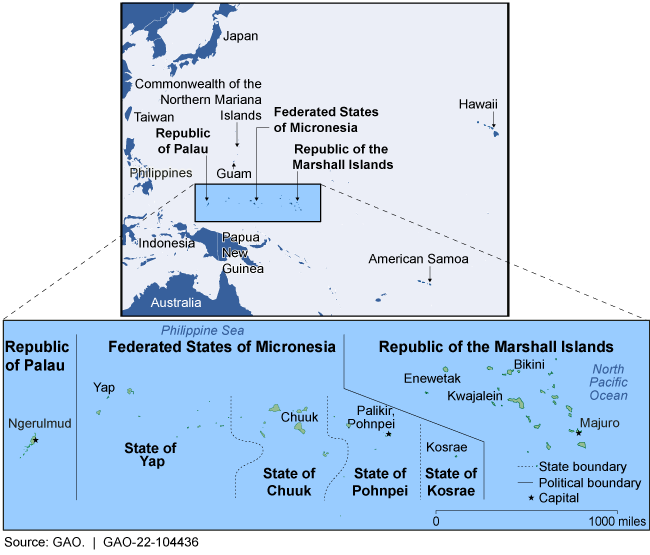Compacts of Free Association: Implications of Planned Ending of Some U.S. Economic Assistance
Fast Facts
U.S. assistance to Micronesia, the Marshall Islands, and Palau provides as much as one-third of the countries' annual budgets. This includes grants—for things like health care and education—that will end in 2023 or 2024, so the U.S. also contributes to trust funds meant to partly replace them.
However, we project that Micronesia's and the Marshall Islands' trust funds will supply less funding than the grants that are ending and may provide none in some years—leading to annual budget gaps.
Also, we found the State Department hasn't set timeframes for establishing an advisory group to help Palau use U.S. funds accountably. We recommended doing so.

Highlights
What GAO Found
The U.S. contributes to trust funds provided pursuant to Compacts of Free Association with the Federated States of Micronesia (FSM), Republic of the Marshall Islands (RMI), and Republic of Palau. These funds are meant to provide long-term budgetary support after certain grant assistance ends after fiscal year (FY) 2023 for FSM and RMI and after FY 2024 for Palau. GAO previously found the FSM and RMI trust funds may not provide sustainable income and recommended that the Department of the Interior work to develop a trust fund distribution policy to address the funds' sustainability. For this report, GAO was asked to project the effects of the ending of certain assistance under the compacts as well as the sustainability of compact trust fund disbursements to replace grants and financially support the three nations. GAO found the following:
FSM. FSM relied on compact sector grants and a supplemental education grant (SEG) ending in FY 2023 for 28 percent of expenditures in FY 2019. GAO projects that disbursements from FSM's compact trust fund will not cover all of the value of these grants, resulting in annual fiscal gaps. Because of rules governing the compact trust fund, FSM faces a 36 percent likelihood of zero disbursements from its compact trust fund in 1 or more years before FY 2034, even though the fund may have a substantial balance.
RMI. RMI relied on compact sector grants and a SEG ending in FY 2023 for 21 percent of expenditures in FY 2019. GAO projects that disbursements from RMI's compact trust fund will not cover all of the value of these grants, leading to annual fiscal gaps. Because of rules governing the compact trust fund, RMI faces a 12 percent likelihood of zero disbursements from its compact trust fund in 1 or more years before FY 2034, even with a projected increasing fund balance.
Palau. Palau relied on compact grants as well as disbursements from its compact trust fund for 13 percent of expenditures in FY 2019. GAO projects minimal disbursement risks to Palau's compact trust fund before FY 2044. As of September 2021, the Department of State, working with Interior, had not established timeframes to constitute the Palau Advisory Group on Economic Reform, which the Palau Compact Review Agreement stipulates is to recommend reforms to enhance long-term economic sustainability.
FSM's, RMI's, and Palau's Total Government Expenditures, by Revenue Source, Fiscal Year 2019

Why GAO Did This Study
The U.S. has provided economic assistance pursuant to its compacts with FSM and RMI since 1986 and with Palau since 1994. This assistance—grants overseen by the Department of the Interior as well as programs and services provided by various U.S. agencies—is intended to promote FSM's, RMI's, and Palau's economic advancement and self-sufficiency. The Department of State is responsible for bilateral relations.
The U.S. has also provided contributions to each country's compact trust fund. FSM and RMI compact trust fund earnings are intended to provide revenue after compact grant assistance ends. Palau is receiving disbursements from its compact trust fund, which is designed to provide revenue until 2045.
GAO was asked to provide an update on U.S. assistance to FSM, RMI, and Palau. This report examines, among other things, (1) the use and role of the U.S. funds and programs in each country's budgets and (2) the projected fiscal effects of the ending of compact grants and certain programs and services. This report also examines the implementation of the Compact Review Agreement for Palau. GAO reviewed compact agreements, U.S. law, and country documents; modeled future compact trust fund performance; and interviewed FSM, RMI, Palau, and U.S. government officials.
Recommendations
GAO is recommending that the Secretary of State, working with Interior, establish timeframes to constitute the Palau Advisory Group on Economic Reform. State concurred with this recommendation.
Recommendations for Executive Action
| Agency Affected | Recommendation | Status |
|---|---|---|
| Department of State | The Secretary of State, working with the Department of the Interior, should establish timeframes with milestones to constitute the Palau Advisory Group on Economic Reform before its 2023 termination date. (Recommendation 1) |
In August 2022, the Department of State indicated that, consistent with the Compact Review Agreement, as amended, the United States and Palau agreed to and designated all five members of the Palau Advisory Group. The Advisory Group convened its first meeting in August 2022.
|
